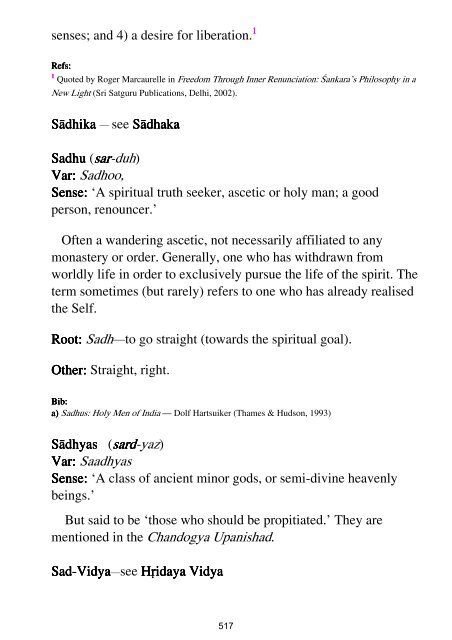Words on the Way - Muz Murray Mantra Yoga Master
Words on the Way - Muz Murray Mantra Yoga Master Words on the Way - Muz Murray Mantra Yoga Master
senses; and 4) a desire for liberation. 1 Refs: 1 Quoted by Roger Marcaurelle in Freedom Through Inner Renunciation: Çankara’s Philosophy in a New Light (Sri Satguru Publications, Delhi, 2002). Sådhika — see Sådhaka Sadhu sar-duh) (sar Var: Sadhoo, Sense: ‘A spiritual truth seeker, ascetic or holy man; a good person, renouncer.’ Often a wandering ascetic, not necessarily affiliated to any monastery or order. Generally, one who has withdrawn from worldly life in order to exclusively pursue the life of the spirit. The term sometimes (but rarely) refers to one who has already realised the Self. Root: Sadh—to go straight (towards the spiritual goal). Other: Straight, right. Bib: a) Sadhus: Holy Men of India — Dolf Hartsuiker (Thames & Hudson, 1993) Sådhyas sard-yaz) (sard Var: Saadhyas Sense: ‘A class of ancient minor gods, or semi-divine heavenly beings.’ But said to be ‘those who should be propitiated.’ They are mentioned in the Chandogya Upanishad. Sad-Vidya Vidya—see H®idaya Vidya 517
Sagu~a (sa-goo-na) Var: Synon: Sense: ‘With qualities:’ that is — an exalted spiritual condition, but one in which is mixed attributes or psychic elements, which are inherently active enough to ensure that one will return to the normal state of consciousness once again. Root: Sa—with, gu~a—attribute. Its antonym is nirgu~a—without attributes. Sagu~a Brahman is therefore the Absolute with attributes added. The sense of ‘I-am-ness’ (acc. Nisargadatta Maharaj). Quotes: Other: Bib: Refs: Saha-gamanam — see Sat⁄ Sahaja nirvikalpa samadhi — see Samadhi Sahajani‚h†hå (sah-har-jah-nish nish-tah) Var: Sahaja Nishta, sahaja-nishta Synon: Sense: ‘Permanently remaining in the natural state of abidance in the Self.’ One established in such steady abidance of the true state of being is sahaja-ni‚h†hå. Såhaµkåra (sah-ham-kar kar-rah) Var: Saahaµkaara, sahamkara 518
- Page 6 and 7: my interpolations in brackets may e
- Page 8 and 9: preceding explanations. Some of the
- Page 10 and 11: A — WORDS on the WAY Å Var: å,
- Page 12 and 13: Sense: ‘Instinctive ‘ clinging
- Page 14 and 15: B — WORDS on the WAY Båbå bar-b
- Page 16 and 17: eligious paraphernalia. Baikhari ja
- Page 18 and 19: it, at the next segment of the spin
- Page 20 and 21: D — WORDS on the WAY Da (dah) Sen
- Page 22 and 23: Dakshina dak-shin-nah) (dak Var: Da
- Page 24 and 25: from a dream in which he experience
- Page 26 and 27: the Apsaras (celestial nymphs and d
- Page 28 and 29: (automatically). This is ajapa Gaya
- Page 30 and 31: Idandra—see Indra Indra (in-drah)
- Page 32 and 33: the state of deep sleep (su su‚hu
- Page 34 and 35: K—WORDS on the WAY Kaivalya (kai-
- Page 36 and 37: the emanation and dissolution of th
- Page 38 and 39: Beside the goddess, two elephants a
- Page 40 and 41: Var: Sense: ‘Middle.’ Mådhya N
- Page 42 and 43: N—WORDS on the WAY Nåda (or Nåd
- Page 44 and 45: In the Tibetan Highest Tantra tradi
- Page 46 and 47: ) “There are two classes of ojas:
- Page 48 and 49: P—WORDS on the WAY Påda da(m) (p
- Page 50 and 51: thighs and the soles pointing skywa
- Page 52 and 53: consciousness, which leads one up t
- Page 54 and 55: Sadashiva. *Para-shakti is the kine
- Page 58 and 59: T—WORDS on the WAY Tadvana (tad-v
- Page 60 and 61: U—WORDS on the WAY Ucchatan ooch-
- Page 62 and 63: V—WORDS on the WAY The letter ‘
- Page 64 and 65: Y—WORDS on the WAY Yagña (yag-ny
- Page 66: Bib: Refs: 1 Kena Upanishad—Comme
senses; and 4) a desire for liberati<strong>on</strong>. 1<br />
Refs:<br />
1 Quoted by Roger Marcaurelle in Freedom Through Inner Renunciati<strong>on</strong>: Çankara’s Philosophy in a<br />
New Light (Sri Satguru Publicati<strong>on</strong>s, Delhi, 2002).<br />
Sådhika — see Sådhaka<br />
Sadhu sar-duh) (sar<br />
Var: Sadhoo,<br />
Sense: ‘A spiritual truth seeker, ascetic or holy man; a good<br />
pers<strong>on</strong>, renouncer.’<br />
Often a wandering ascetic, not necessarily affiliated to any<br />
m<strong>on</strong>astery or order. Generally, <strong>on</strong>e who has withdrawn from<br />
worldly life in order to exclusively pursue <strong>the</strong> life of <strong>the</strong> spirit. The<br />
term sometimes (but rarely) refers to <strong>on</strong>e who has already realised<br />
<strong>the</strong> Self.<br />
Root: Sadh—to go straight (towards <strong>the</strong> spiritual goal).<br />
O<strong>the</strong>r: Straight, right.<br />
Bib:<br />
a) Sadhus: Holy Men of India — Dolf Hartsuiker (Thames & Huds<strong>on</strong>, 1993)<br />
Sådhyas sard-yaz) (sard<br />
Var: Saadhyas<br />
Sense: ‘A class of ancient minor gods, or semi-divine heavenly<br />
beings.’<br />
But said to be ‘those who should be propitiated.’ They are<br />
menti<strong>on</strong>ed in <strong>the</strong> Chandogya Upanishad.<br />
Sad-Vidya<br />
Vidya—see H®idaya Vidya<br />
517



